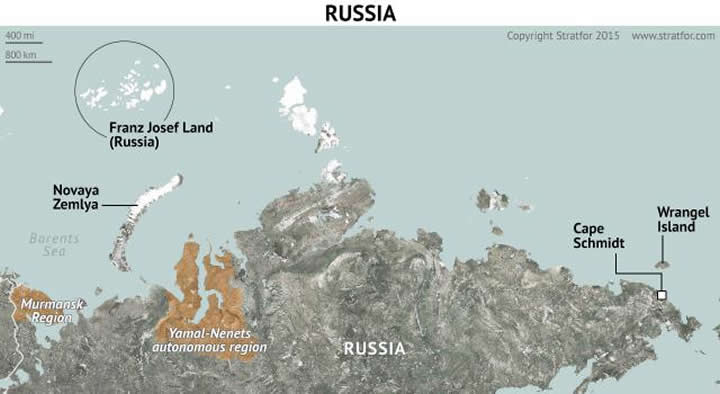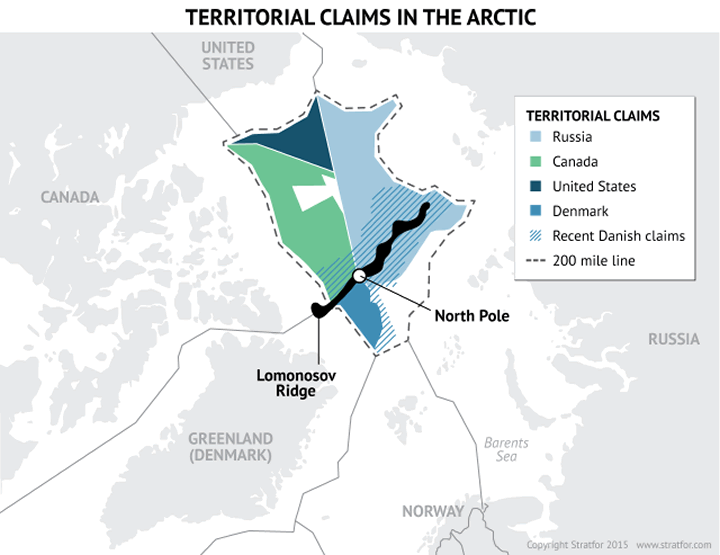Russia's Plans for Arctic Supremacy
Politics / Russia Jan 22, 2015 - 11:14 AM GMTBy: STRATFOR
 Although the crisis in Ukraine continues to focus attention on Russia's western border, Moscow is seeking to exploit a more lucrative prize along its vast northern frontage: the Arctic Circle. Melting ice has opened up new transit routes and revealed previously inaccessible oil and mineral deposits. Facing a year of harsh economic constraints, securing exploitable energy reserves remains a top priority for Moscow. The planned militarization of the Arctic is already underway, and funding is secured through 2015 (the Ministry of Defense was the only Kremlin ministry not to be curtailed in the most recent budget.) With Russia aiming to consolidate its strength by the end of the year, surrounding countries are already reassessing their positions in the face of an overwhelming regional force.
Although the crisis in Ukraine continues to focus attention on Russia's western border, Moscow is seeking to exploit a more lucrative prize along its vast northern frontage: the Arctic Circle. Melting ice has opened up new transit routes and revealed previously inaccessible oil and mineral deposits. Facing a year of harsh economic constraints, securing exploitable energy reserves remains a top priority for Moscow. The planned militarization of the Arctic is already underway, and funding is secured through 2015 (the Ministry of Defense was the only Kremlin ministry not to be curtailed in the most recent budget.) With Russia aiming to consolidate its strength by the end of the year, surrounding countries are already reassessing their positions in the face of an overwhelming regional force.
Analysis
Russia's traditional view of the outside world is colored by a deep sense of insecurity and paranoia. This is best exemplified by the events in Ukraine, where the Kremlin acted to preserve its traditional geographic bulwark against the West. This pattern of protectionism is also apparent in Moscow's current understanding and approach to the situation in the Arctic. Of the eight countries of the Arctic Council, five are members of NATO, fueling Russia's suspicion that opposing forces are massing against it. Although friction with Kiev and the West has overshadowed Russia's military build-up in the Arctic, Moscow's long-term ambitions for the region are making other Arctic countries nervous, Norway in particular.
Russia is interested in the Arctic for a number of reasons, though natural resources and pure geopolitical imperatives are the major driving forces behind Moscow's thinking. The Arctic contains an estimated 30 percent of the world's undiscovered natural gas and 13 percent of its undiscovered oil reserves, regarded by Moscow as important sources of foreign investment that are critical to the country's economic development. The Northern Sea Route from East Asia to Europe via the Arctic Ocean provides another economic opportunity for developing infrastructure in northern Russia.
These resources and transit lanes, however, are also attractive to other Arctic countries, potentially turning the region into a political battleground. The U.N. Convention on the Law of the Sea regulates ownership of the Arctic, allowing for exclusive economic zones stretching 200 miles from land and even further if undersea resources sit on a continental shelf. Inhospitable conditions made previous boundary disputes futile, so the Arctic interior remains open to territorial claims and disputes. The interest expressed by other countries feeds Russia's determination to make its role as a central Arctic nation clear by any means possible, including the use of military pressure.
Russia's Arctic Build-Up
Militarizing the Arctic will be a key imperative for the Russian military throughout 2015 and beyond — alongside modernization in general and bolstering forces in Crimea and the Kaliningrad exclave. According to the Russian Ministry of Defense, Soviet-era bases in the Arctic are being reactivated in response to NATO's renewed interest in the region. The airstrip on the archipelago of Novaya Zemlya is being renovated to accommodate modern and next generation fighter aircraft in addition to advanced S400 air defense systems. Part of the Northern Fleet will also be based on the island chain, which is ideally positioned for operations in the Arctic region. The Northern Fleet represents two-thirds of the entire Russian Navy, which is the only navy in the world to operate nuclear-powered icebreaker ships. In addition, Moscow announced the formation of a new 6,000-soldier military group in the far north consisting of two motorized infantry brigades located in the Murmansk area and the Yamal-Nenets autonomous region. Radar and ground guidance systems are also planned for Franz Josef Land (part of Novaya Zemlya), Wrangel Island and Cape Schmidt. The Federal Security Service plans to increase the number of border guards on Russia's northern perimeter as well.
The recent Vostok 2014 full-scale military exercise — the biggest since the collapse of the Soviet Union — was a revealing indication of Russia's intentions in the Arctic. Russian troops, sailors and airmen carried out combat training missions in the region, prominently deploying Pantsir-S (air defense) and Iskander-M (theater ballistic missile) weapon systems, among others. Such activities inevitably evoke the atmosphere of the Cold War, when the region was the focus of U.S. and NATO attention. Furthermore, Russia's Northern Fleet announced that its Independent Marine Infantry Brigade will undergo intensive training in the Arctic region throughout 2015.

The Kremlin reiterated its intention to field a formidable combined arms force to protect its political and economic interests in the Arctic by 2020. Going into 2015, it is estimated that the Russian armed forces have around 56 military aircraft and 122 helicopters in the Arctic region. Russian Defense Minister Sergei Shoigu stated that 14 military airfields on Russia's Arctic seaboard would be operational by the end of the year. The Ministry of Defense also said some of the 50 modernized MiG-31BM Foxhound interceptors expected by 2019 will be charged with defense duties over the Arctic. Despite the economic problems plaguing Russia, the Ministry of Defense managed to escape the significant budget cuts levied against most other ministries. In fact, the Kremlin has increased defense spending by 20 percent, a clear indication of Russia's priorities for 2015 and a likely indication that Moscow intends to meet its military commitments.
At the end of 2014, Russia established a unified strategic command based around the existing command architecture of the Northern Fleet. The force structure successfully facilitates a military reach across the islands of Russia's northern territories, allowing for better oversight and control of the trade route from China to Norway. This structure also serves the purpose of monitoring — and potentially checking — any military moves by any other power in the region.
Along with the Baltic states and their respective environs, the Barents Sea is under constant surveillance by Russian fighter jets. Russia's dominance in the region was further solidified when, in late December, Russian President Vladimir Putin signed a new military doctrine. In stark contrast to previous dictums, the Arctic region was officially put on the list of Russian spheres of influence for the first time. The same recognition applies to Russia's maritime doctrine, which has two major geopolitical imperatives: a thrust toward the Black Sea and dominion of the near Arctic.
The Norwegian Response
Although Russia's planned expansion in the Arctic may appear aggressive, military authorities in the Kremlin have no desire for an armed confrontation with Western powers. Moscow is aware of NATO's Article 5 agreement, which states that any attack on an individual member country could invoke a unified response from the alliance. Nevertheless, the increased Russian military presence in the region makes neighboring countries uneasy, particularly Norway.
Russia's actions in Ukraine, along with its military exploitation of the Arctic, forced Oslo to reassess Moscow's role and intent in the north, specifically in the area of the Barents Sea. Norway backed the Western application of sanctions against Russia, and subsequent motions from Oslo reveal a major shift in the country's strategic perception of Russia as a potential threat, in addition to highlighting the smaller country's inherent vulnerabilities. Yet, Norway is a leader when it comes to promoting NATO's role in the Arctic; it is the only country in the world that has its permanent military headquarters above the Arctic Circle. Although Norway contributed troops to the multinational force in Iraq and more than 500 personnel to the International Security Assistance Force in Afghanistan — and was one of only seven NATO members to actually carry out air strikes during the Libya campaign — the primary force driver for its military is Arctic security. The Norwegians have invested extensively in Arctic defense capabilities, but, in terms of size and means, they are dwarfed by Russia. Because of this, Norwegian officials, both military and civilian, want to see NATO play a larger role in the Arctic.
Despite a tenuous degree of military cooperation between Norway and Russia in the past involving visits of military officials and occasional joint exercises, conventional wisdom dictated that Oslo did not hold any military exercises near its border with the Soviet Union during the Cold War. This reticence continued after the fall of the Iron Curtain, yet the Norwegian government recently announced its intent to conduct large-scale drills in Finnmark — a territory on the Russia-Norway border — in March 2015. The proposed maneuvers will be the country's largest military exercises since 1967. There is a growing recognition in Moscow that Norway's policy toward Russia is going through a major shift as a direct reaction to Moscow's push to militarize the Arctic region.
Russia's Perception of the Arctic
Russia appears to be gearing up for any eventuality in the Arctic, but its policy-makers are beginning to debate whether Russian pressure in the Arctic serves as a geopolitical pivot that could alter the regional balance of power. The emergence of a dominant Arctic player will certainly affect trans-Atlantic trade routes and commitments, relations between Russia and the northern European countries and relations between Russia and China. For half a century, the Arctic was an area of U.S.-Soviet friction and the site of numerous incidents that could easily have led to conflict. Even in a post-Cold War world, the region could once again be transformed into a zone of frozen conflicts. The great powers have long competed over the Arctic, and now countries such as China and India are expressing their own interest in the region.
Although Russia faces a raft of internal and external problems such as a strained economy, matters in Ukraine and pressure from the international community, the Kremlin remains wedded to its pursuit of the Arctic. This has forced Russia's neighbors to reassess their own military presence in places like the Barents Sea, as well as territorial claims to disputed parts of the Arctic Circle. Norway will press harder for a larger NATO presence in the northern region, but while military conflict remains a threat, Russia will stop short of instigating hostilities. The Kremlin knows that when it comes to acquisitions, actions speak louder than words, and any attempt to grab the rich, unclaimed territory of the Arctic Circle will have to be backed by force.
"Russia's Plans for Arctic Supremacy is republished with permission of Stratfor."
This analysis was just a fraction of what our Members enjoy, Click Here to start your Free Membership Trial Today! "This report is republished with permission of STRATFOR"
© Copyright 2015 Stratfor. All rights reserved
Disclaimer: The above is a matter of opinion provided for general information purposes only. Information and analysis above are derived from sources and utilising methods believed to be reliable, but we cannot accept responsibility for any losses you may incur as a result of this analysis.
STRATFOR Archive |
© 2005-2022 http://www.MarketOracle.co.uk - The Market Oracle is a FREE Daily Financial Markets Analysis & Forecasting online publication.




